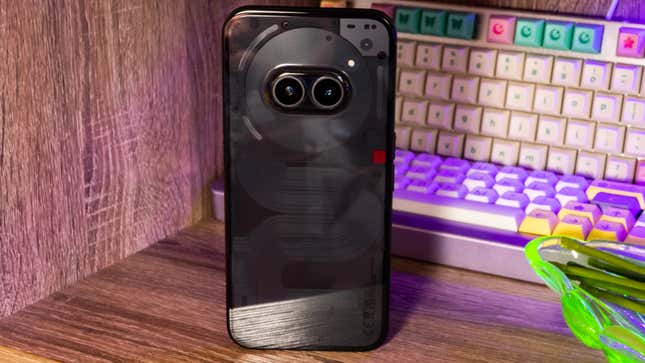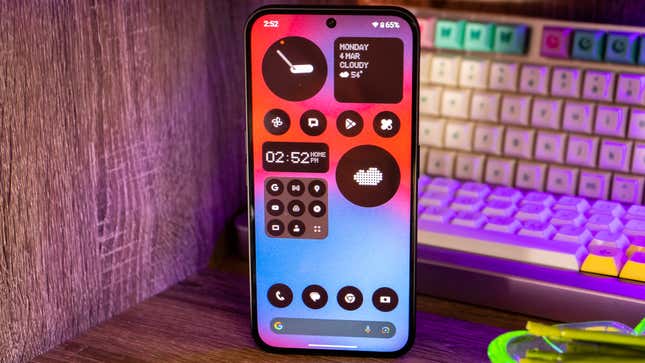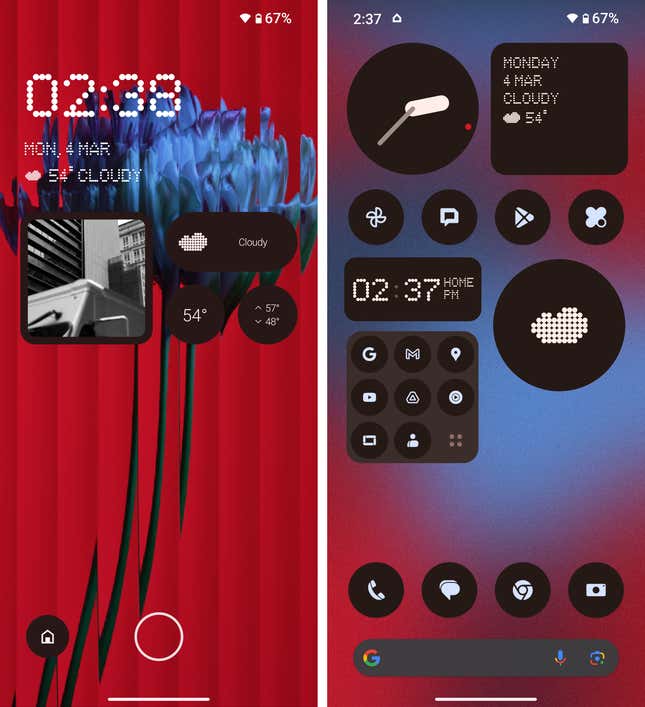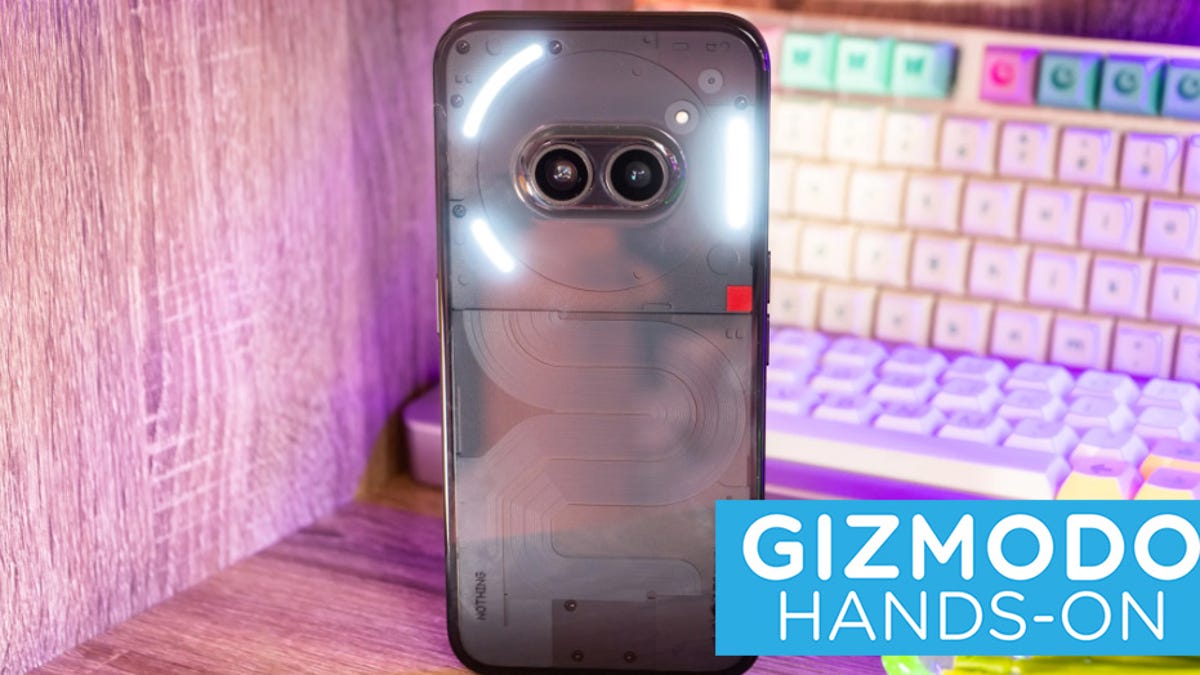The point of a budget smartphone is to exist as the “fast fashion” equivalent of its flagship counterparts. For instance, in the case of the top Android phone seller, Samsung, its A-series delivers some of the brand’s premium experiences at a fraction of the cost. Mid-range Samsung devices are known for sporting the brightest, most vibrant displays, just like their Big Phone counterparts. Or, in the case of Google’s Pixel A-series, it’s a cheaper way to access Google’s camera algorithms and other AI smarts without buying into unnecessary features—like a temperature sensor.
Nothing, the brainchild of Carl Pei, who previously helped lead OnePlus into the open arms of its Oppo Daddy, is launching a budget offering to bring to the mix. Based on the spec sheet, the Nothing Phone (2a) reprises the first-generation Nothing Phone (1). Indeed, when you hold it, it feels like a tribute to the previous phone until you turn the device around to check out the light-up Glyphs—a key Nothing feature—and see that the camera array is horizontal rather than vertical. For $350, the Nothing Phone (2a) may be one of the fanciest phones you can get at this price as long as you don’t mind a version of Android that feels like it’s in progress.
Nothing Phone (2a) Specs

If the Nothing Phone (2a) were a piece of clothing, it would be an athleisure set that didn’t sell so well at the usual brick-and-mortar, so now it’s at the Nordstrom Rack. This isn’t Nothing’s best foot forward, but it’s trying something new here. As a result, the Nothing Phone (2a) has the essence of a fashion statement that didn’t entirely take off when it was supposed to be in vogue.
Like its siblings, the backside is see-through, so you can look at the coils and screws that make up the rear aesthetic of the device. But the relative lightness of the Nothing Phone (2a) reminds you that this is different from what you bought at a higher price.
The Glyphs are here—they’re a core part of the Nothing experience, and on the Phone (2a), there are three Glyph light bars arranged around the circular rear-facing camera module. The camera lenses—a 50-MP primary sensor with OIS and a secondary 50-MP ultra-wide—are stacked across the back of the device. It’s a curious design decision from Nothing, as the last two smartphone devices had a traffic light motif with each lens stacked on top of the other. Some folks have referred to the (2a) back camera array as a “pig snout,” which I think is rude, considering pigs are beautiful creatures. At the very least, this distinct backside will make the Nothing Phone (2a) stand out as the mid-range offering. It’s in stark contrast to Google’s playbook, which is to have the Pixel A series closely resemble the model it’s succeeding.
The Nothing Phone (2a) is squarely a mid-tier device. It runs a Mediatek Dimensity 7200 Pro processor, and it’s available with 8GB or 12GB of RAM. However, the developer program sells it to U.S. users, which will default to 12GB at the same price point. The Phone (2a) has up to 256GB of storage space. For those with access to the 8GB models, the phone starts at roughly $320.
The Phone (2a)‘s 6.7-inch flexible AMOLED display is brighter and bigger than the phone it’s based on, the first-generation Phone (1), which had a 6.5-inch display. The Phone (2a)‘s display brightness tops at 1,300 nits in extreme sunlight, though Nothing says its typical brightness is around 700 nits. That’s still plenty bright. I’m happy that the flexible AMOLED also supports Android’s built-in “Extra Dim” mode, so it goes dark enough at night.
The battery is another selling point of the Nothing Phone (2a). The 5,000 mAh pack promises up to two days of battery on a single charge. I plan to put this through its paces with the review unit. Overall, Android devices have improved with battery offerings in this latest batch of releases. Nothing has to compete with Samsung and Motorola for battery longevity among the mid-range set.
Nothing Phone (2a) OS

The other reason you’d choose a mid-range model from Nothing versus the different brands on the market is the company’s version of Android. It comes chock full of heavily-designed widgets, plus a launcher that lets you change the icons. There are also themed Lock Screen widgets from Nothing, which are sleek with the always-on display.
The Nothing Phone (2a) runs Android 14 right out of the box, underneath Nothing OS 2.5. If you want the whole Nothing experience, you’ll have to adjust how things are set up. I tried to increase the number of icons on the Home screen from four a row to five, and it shrunk the Nothing widgets that they felt were too small to tap. Your mileage may vary, but it’s clear there’s a path you have to take to get the branding.

I also found some inconsistencies pawing through Nothing’s version of Android. For example, some settings options require me to hit “apply” before the change takes place, whereas other options let me tap to adjust a setting, and then I can back out of the screen on to the next thing. It’s subtle but the kind of interface kink that comes up when a manufacturer heavily customizes Android.
On the flip side, there are upsides, too. The Phone (2a)‘s camera system features Nothing’s “TrueLens Engine.” That engine, featuring a host of algorithmic woo-woo, also includes support for Ultra XDR, which Nothing says was co-developed with Google to “ensure a more accurate display of highlights and shadows in every shot.” Mid-range smartphones are bundling in better cameras, but I have concerns, considering Nothing’s Phone (1) was an abysmal shooter.
Where to buy the Nothing Phone (2a)
There’s more to come on the Nothing Phone (2a). Though it’s not likely to be a significant seller the way a phone of this caliber would be from the likes of Samsung or Google—Google has had the most success with its A-series lineup—I’ll be curious to see how this release ranks among the competition. I like the Glyphs and the whimsy they suggest when they light up and go off. But without a camera that can compete with Samsung and Google’s respective releases, the Glyphs are a gimmick.
The Nothing Phone (2a) will be available starting today in select markets. If you’re in London, you can even go to the Nothing Store in Soho and physically be one of the first people to shop for the Phone (2a). For everyone else, you can pre-order today, with the phone becoming publicly available in “most global markets” beginning March 12.

